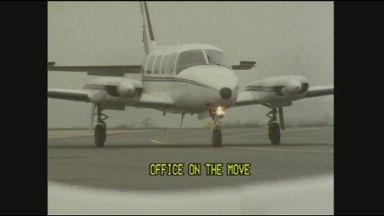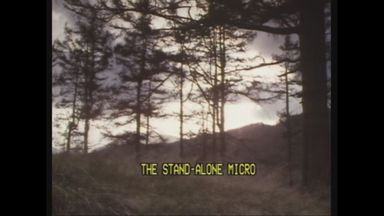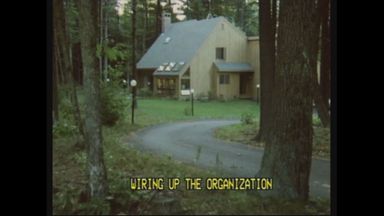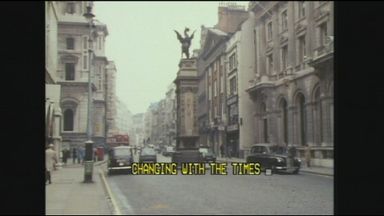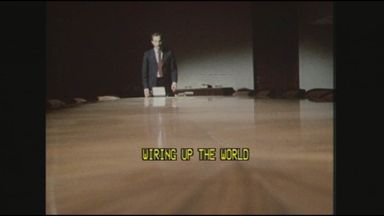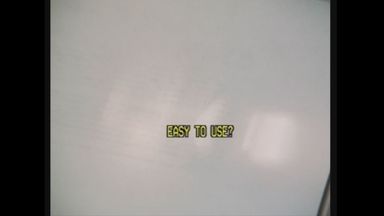Electronic Office
5. Wiring up the World
Clips from this programme
At AT&T, America's biggest telecoms company (the Bell System) is integrating telephone and computer. It has produced its own machine in competition with IBM
Duration: 01:42The Hughes Aircraft Corporation now design circuitry with AT&T to integrate computers into the telephone equipment. Peter Keen of the London Business School discusses the new developments
Duration: 04:33Text to speech (voice mail) developed at the Hughes message centre
Duration: 01:25Ian MacNaught Davis mentions the frustrations of 'telephone tag' and demonstrates how to send and receive messages asynchronously between New York and London
Duration: 03:15Archive footage of the 'Put you through' telephone advertisement
Duration: 00:34Gordon Pocock, the chief executive of BT Merlin discusses improvements in the telephone service and William and Glynn's bank uses a new high speed touch screen system. Fibre optics increase capacity
Duration: 02:55Peter Keen of the London Business School on competitiveness in the banking industry
Duration: 02:09The Halifax Building Society install a new cash machine and other building societies are introducing new online electronic funds transfer. Mac demonstrates using Prestel to move money. The unions have reservations about the effect on the labour force. Peter Keen predicts a big impact on employment.
Duration: 05:51Archive footage of the 'Put you through' telephone advertisement
Duration: 00:39Electronic Office
1. Office on the Move
First broadcast: 12th April 1984
Duration 24:28
1: Office on the Move : The combination of ever cheaper computers and improved telecommunications has produced a quiet revolution on the desks of secretaries, clerks, middle managers and executives, sometimes for good, sometimes for ill. IAN MCNAUGHT-DAVIS. himself the director of a major computer company, begins a six-part examination of the office technology of today and tomorrow. Production MIKE COCKER and DAVID ALLEN
2. The Stand-alone Micro
First broadcast: 19th April 1984
Duration 24:44
2: The Stand-alone Micro : Most of the computers in business are being used for relatively straightforward tasks like word processing, financial planning and simple data base management. IAN MCNAUGHT-DAVIS examines these various 'stand-alone' applications in the second of six programmes about the office technology of today and tomorrow. Production MIKE COCKER and DAVID ALLEN
3. Wiring up the Organisation
First broadcast: 6th May 1984
Duration 24:41
3: Wiring up the Organisation : A microcomputer on its own can perform many useful tasks in the office but as soon as an organisation starts linking computers together into a network, its whole style of working may change dramatically, with a consequent challenge to management. In the third of six programmes IAN MCNAUGHT-DAVIS continues his examination of the office technology of today and tomorrow. Film editor JOHN DlNWOODIE Production MIKE COCKER and DAVID ALLEN
4. Changing with the Times
First broadcast: 10th May 1984
Duration 23:45
4: Changing with the Times How do modern electronic methods affect the working habits and culture of an old established daily newspaper? IAN MCNAUGHT-DAVIS finds out with the help of journalists, editors and others at the New York Times. Film editor JOHN DINWOODIE Production MIKE COCKER and DAVID ALLEN
5. Wiring up the World
First broadcast: 17th May 1984
Duration 24:25
5: Wiring up the World : The microcomputing revolution in business would mean little without the telephone network. Companies can exchange data electronically with each other and even with us, their customers, in a fraction of a second, and this is having a considerable effect on competition. Production MIKE COCKER and DAVID ALLEN
Now playing
6. Easy to Use?
First broadcast: 24th May 1984
Duration 24:32
6: Easy to Use? : Computer manufacturers at present claim 'ease of use' for their machines. In reality most computers are far from easy to use. In this last programme IAN MCNAUGHT-DAVIS takes a look at some of the work being done to humanise the technology. Production MIKE COCKER and DAVID ALLEN












